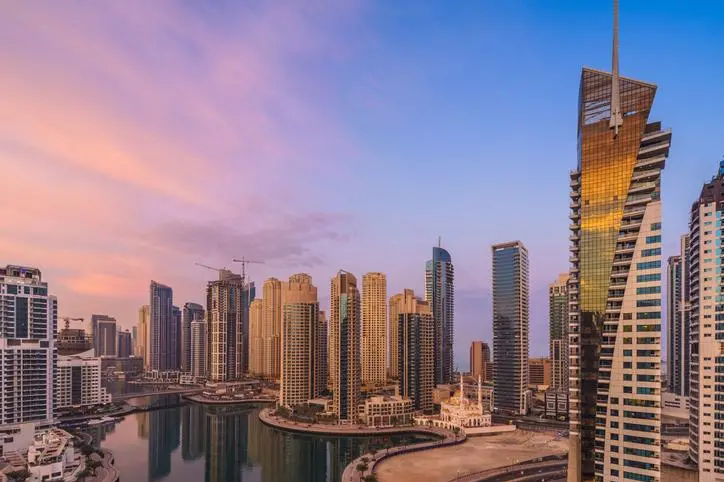PHOTO
The UAE economy is expected to accelerate next year as Expo 2020 Dubai bolsters the tourism, hospitality and retail sectors, however geopolitical tensions in the region and a potential further extension or deepening of Opec production cuts pose downside risks to the outlook, according to a latest FocusEconomics report.
FocusEconomics panelists expect gross domestic product (GDP) to increase 2.4 per cent in 2020 and 2.5 per cent in 2021. They also expect fixed investment to grow 4.1 per cent in 2020, which is up 0.4 percentage points from September's forecast.
The International Monetary Fund (IMF) projected a 2.5 per cent growth rate over the next five years till 2024. The UAE Central Bank also revised the country's forecast upward by 0.4 per cent to 2.4 per cent for 2019 following a strong growth in the first quarter, led by the oil sector.
The IMF, which concluded its Article IV visit in early November, recognised the government efforts to promote the non-oil economy, such as allowing full foreign ownership in selected sectors.
However, the fund noted significant strides are still needed. On the fiscal front, it pointed out current stimulus levels were appropriate, but suggested strengthening fiscal frameworks to ensure long-term fiscal sustainability.
"Growth likely expanded at a softer pace in the second quarter as ongoing compliance with Opec production cuts seemed to drag significantly on the energy sector. Conversely, the non-energy economy appears to have accelerated as the non-oil sector PMI surged in second quarter," said Steven Burke, economist at FocusEconomics.
"Turning to second half of 2019, growth is expected to be slowing further. The non-oil sector PMI posted the joint-lowest reading since May 2010, due to paltry demand and weaker output growth," he said, adding that volatile oil prices represent a degree of uncertainty for the UAE economy.
PMI steady in October
The IHS Markit Purchasing Managers' Index (PMI) was steady in October at September's 51.1. Thus, the index remained above the 50-threshold that separates expansion from contraction in the non-oil producing private sector. In October, growth in new orders fell to a series record low, as export orders declined for the first time since April 2018 amid a subdued global growth outlook.
Moreover, both output and employment levels increased at a tepid pace in October. Business prospects of future production levels improved in October, but remained relatively subdued nonetheless, the report said.
On the price front, input prices ticked up, while output prices continued to fall as firms tried to entice demand. "Next year, the non-oil private sector will likely gain some impetus as solid fiscal support, a dovish stance taken by major central banks and Expo 2020 continue to underpin the non-oil private sector. Nevertheless, heightened global economic uncertainty poses a downside risk to the outlook," Burke said.
Non-oil sector slowdown
Meanwhile, Moody's Investors Service said structurally lower growth in the UAE's non-oil sector economy will weigh on revenue growth in Dubai and Sharjah.
In a latest report, Moody's said non-oil economic activity is likely to remain below historical levels across the UAE over the next few years and it may impact the government revenue in Dubai and Sharjah. However, Abu Dhabi is more insulated from these pressures because its non-oil revenues are relatively small compared to hydrocarbons and investment income from the Abu Dhabi Investment Authority (Adia) which comprise the vast majority of government revenues.
"Dubai and Sharjah's revenues are more vulnerable to slowing macroeconomic conditions, as their revenue bases are reliant on government fees, fines and to a lesser extent, tax revenues," said Thaddeus Best, a Moody's analyst and the report's author.
Moody's expects the slowdown to be protracted because of the soft labour market, structural constraints facing the UAE's tourism and shipping sectors and wage deflation, which is likely to feed through to residential rents and retail trade.
New taxes coordinated at federal-level, such as VAT, have been very successful, but no new federal-level revenue measures are currently planned apart from a small expansion of excise tax at the end of this year. At the same time, despite a high level of fiscal autonomy, there are practical limits on the implementation of emirate-level measures given the high level of inter-emirate competition within the UAE's single market.
"Given these constraints, there is a higher risk that Dubai and Sharjah may have to increase their reliance on upstreamed transfers and dividends from government-related entities if their existing non-tax revenue streams underperform.
While such a move would be unorthodox, as GREs within the UAE are typically run at arms' length from the government and with a high level of operational independence, it would not be without precedent," the report said.
- muzaffarrizvi@khaleejtimes.com
Copyright © 2019 Khaleej Times. All Rights Reserved. Provided by SyndiGate Media Inc. (Syndigate.info).





















